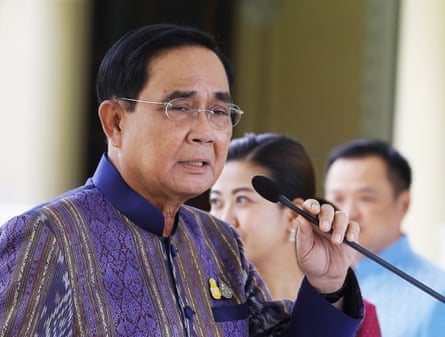Thailand’s parliament will gather for a high stakes vote on Thursday that will determine whether the leader of the country’s most popular and progressive party can take power after almost a decade of rule by the former army chief who seized power in a military coup.
The progressive Move Forward party, which campaigned promising major reforms to the economy and the country’s power structures, shocked opponents by winning the most seats in May’s election.
If it were to take power, it would mark a dramatic turnaround for Thailand, which has been ruled by former military general Prayuth Chan-ocha, a staunch royalist and conservative, since he took power in the 2014 coup and was reelected in 2019.
On Tuesday Prayuth said he would retire from politics, but would remain as caretaker prime minister until a new government was formed. But while Prayuth may be stepping back, analysts say the undemocratic structures that were introduced under his rule remain in place.
Under Thailand’s election laws, Move Forward’s leader, Pita Limjaroenra, will need to win majority support from the 500 elected MPs in the lower house and the 250 members of the Senate. The latter were appointed by the military after the last coup, and it is unclear if they will back Pita, despite his party coming first in May’s election.
If Pita fails to get enough votes, that could result in political deadlock and protests from supporters. A designated protest site will be available for people to gather near parliament when the vote takes place, local media has reported.
‘Vote for democracy’
In his efforts to secure the prime ministership, Pita has been rallying supporters in the run-up to the vote, urging senators to back the will of the people.
“We’re asking them to vote for democracy, for the majority, and to return normalcy to Thai politics, so we can finally move forward,” he said at a gathering on Sunday.
Pita, who has said he is confident he has enough support, has formed a coalition with other opposition parties which will grant him 312 votes. This means he needs at least 64 votes from either senators or MPs outside his coalition in order to become prime minister.

The major sticking point is Move Forward’s promise to reform the country’s lese-majesty law, under which criticism of the monarchy can lead to up to 15 years in prison. The law has been used against more than 250 people, including children, since 2020, when mass youth-led protests erupted against the long-held notion that the monarchy must be revered and not questioned.
One senator, Seree Suwanpanont, said he would not support Pita due to his party’s stance on the law. “If they reduce the sentence then anyone can criticise [the monarchy] or do whatever. That will create more problems for the nation, and most of the senators think the same way.”
However, some senators have said they will support Move Forward in order to reflect the will of the people. Many others have remained silent about how they will vote, making the outcome of Thursday’s ballot hard to predict.
Conservatives concerned
The prospect of a Move Forward-led government is alarming to conservatives not only because of the party’s stance on the lese-majesty law but due to its broader promise to change the country’s power structures, according to Punchada Sirivunnabood, an associate professor at Mahidol University.
The party has promised to cut the military budget, decentralise power and break up the big monopolies so that the economy is more fairly distributed.

“There are connections among the Senate and the current administration,” Punchada said. “It’s about the advantages that the old generation of the conservative side will lose if Move Forward get into power.”
Thursday’s vote is not the only hurdle Pita faces. A legal case filed by a conservative opponent, which could result in jail time or a ban from politics, also hangs over him.
If Pita fails to secure enough support, the vote in parliament can be rerun. Three days have been designated for the ballot.
Senator Prapasri Suchantabutr said she planned to support Pita for democratic reasons. “I think it will go smoothly. If the first party doesn’t get it, we still have the second party,” she said, referring to Move Forward’s coalition partner Pheu Thai, the party associated with exiled leader Thaksin Shinawatra.
Pheu Thai has promised to stick by Move Forward, though experts have speculated that if Pita fails to gain support, it could put forward its own leader as a prime ministerial candidate either as part of the existing coalition arrangement or by joining with conservative parties.
Pheu Thai, which prior to May had won the most seats in every election since Thaksin first came to power in 2001, had expected to triumph in this year’s vote. However, Move Forward managed to win its seats, even in Thaksin’s home town, Chiang Mai.
Analysts warn that there is a risk of demonstrations if the public will is seen to have been undermined. If protests were to erupt, these could involve Move Forward’s very broad support base, said Panuwat Panduprasert, an assistant professor at Chiang Mai University.
“Move Forward gained votes from pretty much all over Thailand,” he said. “All sectors, all generations, all kinds of people.”


